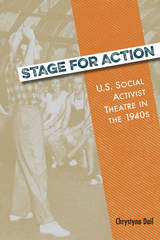
Exploring the intersection between performance and politics and the direct impact of the arts on social activism, Dail argues Stage for Action is a theatrical reflection of progressivism and the pro-working-class theatrical aesthetic of the 1940s. The theatre group, which used performance to encourage direct action and personal responsibility for change, eventually would function as the theatrical voice of the United States Progressive Party in the failed presidential campaign of former vice president Henry A. Wallace.
Calling into question the widely held belief that U.S. theatre in the early years of the Cold War was indifferent to activism, Stage for Action offers historians a new interpretation of social activist performance at midcentury.
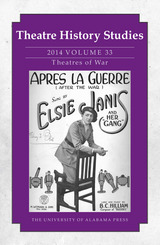
War and theatre is a subject of increasing popularity among scholars of theatre. The essays in this special edition of Theatre History Studies brings together a unique collection of work by thirteen innovative scholars whose work explores such topics as theatre performances during war times, theatre written and performed to resist war, and theatre that fosters and promotes war.
The contributors to this volume write poignantly about nationhood and about how war—through both propaganda and protest—defines a people. The contributors also delve into numerous fascinating themes that transcend time, peoples, nations, and particular conflicts: the foundations of nationalism and the concepts of occupied and occupier, nostalgia and utopia, and patriotism and revolution.
These essays survey a march of civil and international wars spanning three centuries. Arranged chronologically, they invite comparisons between themes and trace the development of the major themes of war. Ideas manifest in the theatre of one period recall ideologies and propaganda of the past, reflect those of the present, and anticipate wars to come.
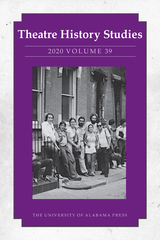
THEATRE HISTORY STUDIES, VOLUME 38
PART I: Studies in Theatre History
MATTHIEU CHAPMAN
Red, White, and Black: Shakespeare’s The Tempest and the Structuring of Racial Antagonisms in Early Modern England and the New World
MICHAEL CHEMERS AND MICHAEL SELL
Sokyokuchi: Toward a Theory, History, and Practice of Systemic Dramaturgy
JEFFREY ULLOM
The Value of Inaction: Unions, Labor Codes, and the Cleveland Play House
CHRYSTYNA DAIL
When for “Witches” We Read “Women”: Advocacy and Ageism in Nineteenth-Century Salem Witchcraft Plays
MICHAEL DENNIS
The Lost and Found Playwright: Donald Ogden Stewart and the Theatre of Socialist Commitment
Part II: HEMISPHERIC HISTORIOGRAPHIES
EMILY SAHAKIAN, CHRISTIANA MOLLDREM HARKULICH, AND LISA JACKSON-SCHEBETTA
Introduction to the Special Section
PATRICIA YBARRA
Gestures toward a Hemispheric Theatre History: A Work in Progress
ERIC MAYER- GARCÍA
Thinking East and West in Nuestra América: Retracing the Footprints of a Latinx Teatro Brigade in Revolutionary Cuba
ANA OLIVAREZ-LEVINSON AND ERIC MAYER-GARCÍA
Intercambio: A Visual History of Nuevo Teatro from the Ana Olivarez-Levinson Photography Collection
JESSICA N. PABÓN-COLÓN
Digital Diasporic Tactics for a Decolonized Future: Tweeting in the Wake of #HurricaneMaria
LEO CABRANES-GRANT
Performance, Cognition, and the Quest for an Affective Historiography
Part III: Essays from the Conference
The Robert A. Schanke Award-Winning Essay, from the 2019 Mid-America Theatre Conference
JULIE BURRELL
Reinventing Reconstruction and Scripting Civil Rights in Theodore Ward’s Our Lan’
The Robert A. Schanke Honorable Mention Essay, MATC 2019
MATTHEW MCMAHAN
Projections of Race at the Nouveau Cirque: The Clown Acts of Foottit and Chocolat
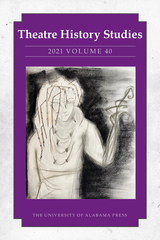
Introduction
—LISA JACKSON-SCHEBETTA, WITH ODAI JOHNSON, CHRYSTYNA DAIL, AND JONATHAN SHANDELL
PART I
STUDIES IN THEATRE HISTORY
Un-Reading Voltaire: The Ghost in the Cupboard of the House of Reason
—ODAI JOHNSON
Caricatured, Marginalized,
and Erased: African American Artists and Philadelphia’s Negro Unit of the FTP, 1936–1939
—JONATHAN SHANDELL
Stop Your Sobbing: White Fragility, Slippery Empathy, and Historical Consciousness in Branden Jacobs-Jenkins’s Appropriate
—SCOTT PROUDFIT
Asia and Alwin Nikolais: Interdisciplinarity, Orientalist Tendencies, and Midcentury American Dance
—ANGELA K. AHLGREN
PART II
WITCH CHARACTERS AND WITCHY PERFORMANCE
Editor’s Introduction to the Special Section
Shifting Shapes: Witch Characters and Witchy Performances
—CHRYSTYNA DAIL
To Wright the Witch: The Case of Joanna Baillie’s Witchcraft
—JANE BARNETTE
Nothing Wicked This Way Comes: Shakespeare’s Subversion of Archetypal Witches in The Winter’s Tale
—JESSICA HOLT
Of Women and Witches: Performing the Female Body in Caryl Churchill’s Vinegar Tom
—MAMATA SENGUPTA
(Un)Limited: The Influence of Mentorship and Father-Daughter Relationships on Elphaba’s Heroine Journey in Wicked
—REBECCA K. HAMMONDS
Immersive Witches: New York City under the Spell of Sleep No More and Then She Fell
—DAVID BISAHA
PART III
Essay from the Conference
The Robert A. Schanke Award-Winning Essay, MATC 2020
New Conventions for a New Generation: High School Musicals and Broadway in the 2010s
—LINDSEY MANTOAN
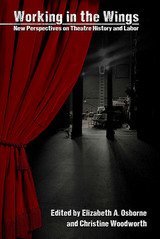
Theatre has long been an art form of subterfuge and concealment. Working in the Wings: New Perspectives on Theatre History and Labor, edited by Elizabeth A. Osborne and Christine Woodworth, brings attention to what goes on behind the scenes, challenging, and revising our understanding of work, theatre, and history.
Essays consider a range of historic moments and geographic locations—from African Americans’ performance of the cakewalk in Florida’s resort hotels during the Gilded Age to the UAW Union Theatre and striking automobile workers in post–World War II Detroit, to the struggle in the latter part of the twentieth century to finish an adaptation of Moby Dick for the stage before the memory of creator Rinde Eckert failed. Contributors incorporate methodologies and theories from fields as diverse as theatre history, work studies, legal studies, economics, and literature and draw on traditional archival materials, including performance texts and architectural structures, as well as less tangible material traces of stagecraft.
Working in the Wings looks at the ways in which workers' identities are shaped, influenced, and dictated by what they do; the traces left behind by workers whose contributions have been overwritten; the intersections between the sometimes repetitive and sometimes destructive process of creation and the end result—the play or performance; and the ways in which theatre affects the popular imagination. This collected volume draws attention to the significance of work in the theatre, encouraging a fresh examination of this important subject in the history of the theatre and beyond.
READERS
Browse our collection.
PUBLISHERS
See BiblioVault's publisher services.
STUDENT SERVICES
Files for college accessibility offices.
UChicago Accessibility Resources
home | accessibility | search | about | contact us
BiblioVault ® 2001 - 2024
The University of Chicago Press









